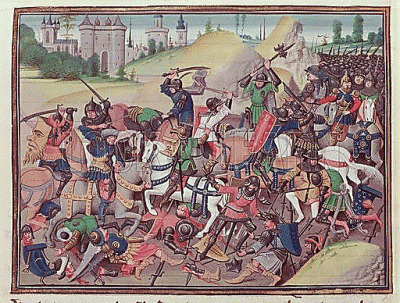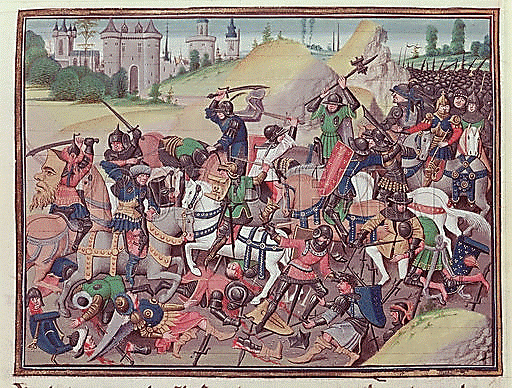 Islamic extremists have been known to cite passages of the Koran to justify killing non-believers. Western conservatives, in turn, such as those at ReligonofPeace.com (facetious), delight in such quotes. For example:
Islamic extremists have been known to cite passages of the Koran to justify killing non-believers. Western conservatives, in turn, such as those at ReligonofPeace.com (facetious), delight in such quotes. For example:
(8:12) – “I will cast terror into the hearts of those who disbelieve. Therefore strike off their heads and strike off every fingertip of them.”
As well as Hadith (sayings ascribed to Muhammad):
Ibn Ishaq/Hisham 327: – “Allah said, ‘A prophet must slaughter before collecting captives. A slaughtered enemy is driven from the land.”
On the other hand, conservatives are only too happy to give the Old Testament of the Bible a pass on its vaunted violence. From ReligionofPeace again:
Unlike nearly all of the Old Testament verses of violence, the verses of violence in the Quran are mostly open-ended, meaning that they are not restrained by the historical context of the surrounding text. They are part of the eternal, unchanging word of Allah, and just as relevant or subjective as anything else in the Quran.
In two previous posts — Sanctifying the Killing of Muslims and The Secret to Islam’s Rapid Expansion: Free Love (?) — I wrote about and excerpted Armies of Heaven: The First Crusade and the Quest for Apocalypse (Basic Books, 2011) by American medieval historian Jay Rubenstein. The first Crusade provided Christians with their first opportunity to indulge in wholesale killing of Muslims, which include. The book of the Bible they used to justify it — if not the decapitation and even cannibalism that succeeded the killing — was Deuteronomy. From Armies of Heaven again:
According to Deuteronomy 20:20-15, if the Children of Israel intended to attack a city, they were obligated first to offer it peace. If the city accepted, its inhabitants would be spared but enslaved. … if negotiations failed, the Israelites were to lay siege to the city, capture it, kill all of the men, and claim everything else therein — women, children, and livestock — as plunder.
Tough to figure out why that has to be included in a holy book. But, wait, it gets worse. Rubenstein explains that “Deuteronomy describes a third possible outcome: ‘In the cities of the nations that the Lord God is giving you as an inheritance [alleged author Moses is stretching the definition of the word inheritance pretty wide here — RW] — “do not leave alive anything that breathes. Complete destroy them.”
Thus did the first Crusade apply these laws to the grisly Siege of Antioch on the way to Jerusalem. Rubenstein:
Albert of Aachen estimated the number of Saracens [Muslims] dead at 10,000 and said that the Franks [Crusaders] “spared none of the [Muslims] on the basis of age or gender, as the earth grew covered with the bodies and blood of the dead.” As Raymond of Aguilers [a Crusade commander] hurried to see the killing, he found it “an amusing spectacle,” … “All the public squares were filled with dead bodies,” another eyewitness observed. … “In truth, no one could walk through the city streets without treading on corpses.”
The crusaders not only used rules from the Bible but sought to emulate battles from the Bible. They compared another battle that turned into a slaughter to, Rubenstein writes, “what happened to the tribe of Benjamin in the Book of Judges [when the Israelites] killed 25,000 of the [Benjaminites] and then afterward they destroyed their cities, their animals, their women, and their children.”
In short …
Had the crusaders ever followed this ethos in their European homeland, their actions would have been viewed as atrocities. But in the context of a holy war intended to re-create those same Old Testament battles fought in the same deserts where the Israelites had wandered, atrocities were standard practice. The result was a new level of violence, leading to battles that in scale and character were truly apocalyptic.
No doubt more atrocities ensued when the crusaders reached Jerusalem — my history is weak and I’m 100 pages from concluding the book. But at least there’s this …
The levels of bloodshed and brutality were so far beyond ordinary warfare that the experience of it would have changed the warriors’ sense of their own humanity.
Enduring post-traumatic stress syndrome is a small price to pay when God is on your side.
